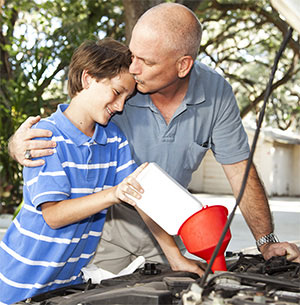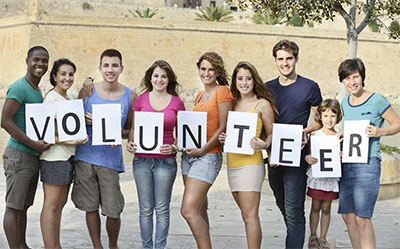Happy & Healthy Children
A healthy child is not only the product of a healthy diet, but also a nurturing and healthy environment. Let's talk about some of the key elements that can help set your child on the right track and that will go far in creating a happy, healthy, and well-adjusted child.
Children Are a Product of Their Environment
|
Instincts are fundamental, built-in behaviors geared towards the survival of all humans, independent of the culture we are born to. Children quickly learn to observe the responses of their parents and other authority figures around them, whether they be love-based or fear-based. These observations then affect how they respond to the world and often become powerful enough to override genetically programmed instincts.
For example, a baby is born with a natural ability to swim. But if a parent fears the water, the chance that they will instill this same fear into their children is strong. As parents, we may not be aware that our fears and our beliefs become our children's.
In her book "Quantitative EEG & Neurofeedback," Dr. Rima Laibow demonstrates that brainwave activity reflects how children are extremely susceptible to their environment during the first 6 years of their life:
- Between birth and 2 yrs. of age, a child's brain predominantly operates at a very low frequency known as delta.
- Between 2 and 6 yrs. of age, a child spends more time in a higher frequency known as theta.
Both delta and theta are considered frequencies that are highly suggestible and programmable. In fact, hypnotherapists bring their patients into delta and theta states for that exact reason: To put them into a more suggestible and programmable state.
During this young age, children are dramatically affected by their environment and those who take care of them. They develop perceptions and beliefs that become hardwired and that exert a long-lasting impact on their lives. The words and actions of parents and authority figures during a child's first 6 years of life are very influential.
Words such as "you stupid child" or "you're useless" or "it's all your fault" can have long-lasting effects. So can a tense and argumentative environment. At such a young age, a child cannot rationalize or critically assess what they hear and see. Words simply become accepted as true. As children enter into their teenage years, they are a mass of programmed beliefs and behaviors collectively learned from their environment. The limits a child learns are a product of those programmed into them by this environment.
The Importance of Affection & Touching
 In general, studies of cultures that openly love their children and engage in affection and physical contact show the society to be more peaceful and less violent. In contrast, children who are deprived of loving, tactile bonding are more repressed, withdrawn, and violent in nature.
In general, studies of cultures that openly love their children and engage in affection and physical contact show the society to be more peaceful and less violent. In contrast, children who are deprived of loving, tactile bonding are more repressed, withdrawn, and violent in nature.
Unfortunately, the American culture is not a very touchy-feely one. As compared to the Europeans such as the Greeks and Italians, Americans as seem downright frigid!
- A study was conducted of 60 Romanian children who ranged from several months to 3 yrs. of age. The study concluded that a lack of touching and attention in Romanian orphanages, and poor quality care, stunted the growth of the children and adversely affected their behavior. The more stressed the child was, the poorer the outcome for the child, as evidenced by raised cortisol levels in the blood.(1)
-
Dr. James Prescott, neuropsychologist and former director of the NIH’s Human Health & Child Development Div., established a number of basic research programs with other respected scientists. These programs documented that the absence of "mother love" resulted in monkeys that developed brain dysfunction and damage, and depression, movement disorders (such as rocking behaviors and self-mutilation), hyper-reactivity to sensory stimulation, social alienation, rage, and violent behavior against other animals.
Prescott also studied puppies reared in social isolation at McGill University, in Montreal, Canada. The studies showed not only abnormal adult emotional and social behaviors, but also abnormal brain development and functioning. This abnormal behavior is commonly noted in animals that have been reared in isolation.(2)
Exercise & Activity
It is important for children to be both active and playful. With the right encouragement, children can be incredibly creative. Parents can help their children by giving them the freedom and the tools they need to express their creative talents. Learn what you can do to help your child flourish!
How to nurture creativity & individuality...
As children grow older, encourage them to engage in active hobbies or sports they enjoy. Never force sports on your children, but rather expose them to different activities and see what they naturally enjoy and gravitate too. Perhaps it is a team sport such as basketball or soccer. Or it may be an individual sport such as ice skating, swimming, or roller-blading. If your children love being around animals, they may choose horse riding.
Helping out at the local animal shelter can be a great way to encourage your children to not only be active, but to help animals who need it. Activities that instill a sense of community and providing help to those who need it help foster a child to care about the people and the environment around them.
If money is tight, there are many activities that do not have to cost a thing. Check out your local community center or meet-up groups. Long trail walks with a picnic can be lots of fun; bring the dog along and make it a family experience and walk for a good 3-5 miles at a time. As a child, my mother and I would often take long walks in Northern England in excess of 8-10 miles and I have many, many fond memories of how much I enjoyed them.
Sometimes sports can be expensive. Encouraging your children to volunteer their time as they grow older in return for instruction can be a wonderful way to instill a sense of responsibility. For example, your child may enjoy horse riding but you simply cannot afford the lessons. How about talking to the stables about their volunteering to clean the stables or groom the horses in return for lessons? Not only are they learning about how to take care of a horse, but they open themselves up to more opportunities to meet friends with similar interests. Some of the most incredible bonding experiences children can have are with animals.
Connection & Communication
National Longitudinal |
Developing open and honest communication early in your child's life can help offset the difficulties during the challenging teenage years. A study of 90,000 teens concluded that "connectedness" - a feeling of being loved, accepted, understood, and wanted - emerged as by far the biggest protector against emotional distress, suicidal thoughts, and addictions such as smoking, drinking, and using drugs.
Talk about subjects openly, especially the ones that are sensitive such as drugs and sex. Encourage questions and be open, straightforward, and non-judgmental with your answers. It is also important to never chastise your children for their questions and curiosity.
Research shows that children who hear the facts about drugs and alcohol from their parents in a non-confrontational and non-dogmatic way are significantly less likely to use them. The more you educate your children about these subjects BEFORE they become a bigger topic of conversation, the higher the chance they will decide to act responsibly when the time comes.
At an age where children are highly susceptible to outside influences such as that of their peers, studies show that they are less likely to use drugs if parents communicate the dangers of drugs, set clear rules about not using them, and consequences for breaking those rules while living under their roof.
How to communicate with your child...
Do NOT Overprotect Your Child
As parents, we naturally want to protect our children from the bad things in life. The challenge is to also stand back and allow our children to experience difficult situations and help them develop the skills to effectively master these situations. Doing too much to shield children from the experiences of life, over-coddling them, and doing things for them that they should be doing for themselves, can set children up for a very rude awakening when they enter adulthood.
We have all heard the term "spoiled brat." The fault for this lies squarely on the shoulders of the parents. Spoiling children leads them to expect something for nothing, and does not foster a sense of responsibility. Instead, they become self-centered, demanding, and rude. They grow up with a sense of entitlement at the expense of others. When their demands are not met as adults, they become confused and disappointed and are less able to be self-sufficient because they have been habitually handed things on a silver platter.
Don't confuse loving your children with spoiling
them. One has nothing to do with the other.
Instill a Strong Work Ethic
As your child grows older, instilling a strong work ethic helps build confidence and self-esteem in their capabilities. It also provides them with real-world experience and gives them a head start in life. If there is something your child wants, such as a pet or tech device, help them realize that they have a part to play in receiving this gift such as chores around the house, helping with projects, and getting good grades. Some things require commitment. A puppy, for example, need time and attention, and daily exercise.
 Expect Your Teen to Work or Volunteer
Expect Your Teen to Work or Volunteer
For teenagers who ask for expensive items such as laptops and cars, ask what they can do to help pay for these items. It does not matter how wealthy you are and if you can easily afford them. Wealth has nothing to do with it.
For younger teens, perhaps it is offering to mow the neighbor's yard or running errands for a small fee. For older teens, a part time job is not only a good idea but should be expected.
![]()
When it was time for my first car, my parents were more than financially capable of buying me the best that money could buy, but they recognized that encouraging me to take financial responsibility was important in setting me up for success in the real world.
Their approach was that whatever money I earned, they would match it up to $2,000. Not only that, but I would be responsible for the car insurance payment. Why was this important? Because after 2 tickets, I very quickly realized that if I wanted to be able to afford the insurance, I'd better clean up my act because my measly part-time paycheck was quickly used up by the insurance payment!
This lesson would not have hit home nearly as hard if my parents simply paid for my insurance for me. Sure, they could have just paid it all for me, but they were much smarter than that - they were teaching me to be responsible and understand the value of money earned.
![]()
| When teens graduate from high school and college and look to begin a career, an applicant with prior work experience as opposed to those with no experience will always receive preferential consideration and higher pay. |
Fresh Air & Sunshine
Children should always be encouraged to spend time outdoors. Have fresh air circulating in your home rather than continually recirculating indoor air. Come rain or shine, cold weather or warm weather, aim to open the windows at least 15 minutes each day to promote fresh air throughout your home.
A word about sunscreens
Vitamin D is a very an important nutrient and it is synthesized by our exposure to sunlight. There is an epidemic of Vitamin D deficiency, in part because the medical community has people petrified of the sunshine. Not only do adults and children not spend enough time outside, but when they do, they cover their skin with SPFs that prevents this important nutrient from being synthesized in their body.
In the times of our grandparents, there was no such thing as a skin cancer epidemic, and no-one was covering their skin with highly chemicalized sunscreens that studies are now conclusively linking to not only skin cancer, but to other skin conditions. These same studies are showing that sunlight is an innocent bystander in the development of melanomas, and that ironically, sunlight is protective against this condition. Many popular sunscreens, lotions and moisturizers are terrible for your skin, filled with toxic chemicals and additives that can cause allergic reactions and skin irritation. They have no place on your own skin, never mind your child's skin.
Ensure that your child is exposed to some degree of sunshine without using these lotions. When you do use a sunscreen, always choose mineral sunscreens such as zinc oxide and titanium dioxide as the primary ingredients, and avoid any sunscreen that contains a long list of other ingredients, including fragrances (unless they are from essential oils).
Learn more about sunscreens, vitamin D, and why vitamin D is more effective than the flu shot in the Body Healer protocol.
Clear Out the Toxins
When it comes to a safe home environment, often parents completely overlook common items that pose hazards. It is easy to assume that the household and garden products we use hold no concern, but this is usually not the case. Not only do some of the most commonly used products cause acute conditions, but long-term exposure can result in both physical and neurological health damage.
Transform your home into a healthy haven
The Body Healer Protocol
RELATED ARTICLES
- Why kids are getting sicker & fatter
- Before birth - prenatal care
- Baby's first food
- Beginning solid food
- Healthy eating guide for children
- Why breast feeding is important
- Bone broth
- Pasteurized vs. raw dairy
- The health benefits of raw milk
- The importance of organic during pregnancy
- Serious dangers of pesticides in our food
- Vaccinations & children
- Healthy, strong teeth
- Tips on raising happy & healthy children
- Nurturing creativity & individuality
- Discipline & setting boundaries



